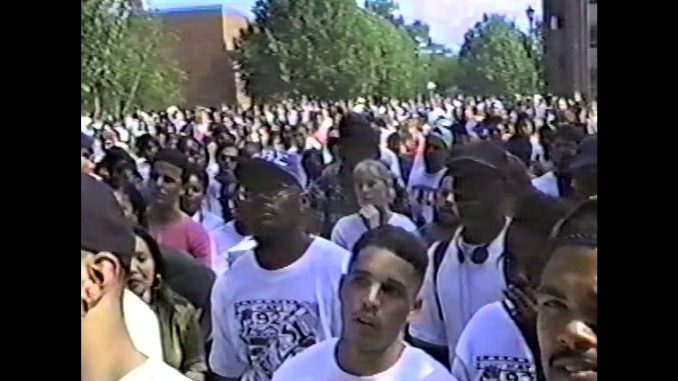
Hannah Lonergan | Staff Writer
“Looking to the Future, Remembering the Past,” an event hosted by the Students of Color Coalition, reinforced the need to revisit Oneonta’s questionable past. I attended the virtual event on Microsoft Teams, which took place on Sept. 11, just a week after the twenty-eighth anniversary of the Blacklist. The event continued the much-needed conversation on police interference, tokenization, having a sense of belonging in college and representation within education.
President Barbara Jean Morris and newly appointed Chief Diversity Officer Bernadette Tiapo also attended Friday’s event. President Morris commented on the discussion after it ended, “The Blacklist was an act of racism. It remains a wrong that can never be righted. On behalf of SUNY Oneonta, I am deeply sorry.”
Sophia Monsalve, host and VP of the Students of Color Coalition, started the discussion with a review of the Blacklist. Events that transpired in 1992 became the longest litigated civil rights case in the United States. SUNY Oneonta had given police the names and addresses of all the black male students at Oneonta, following the alleged rape of en eldery woman. Even in the present, we should be critical about the orders you’re giving, and the orders you receive.
Students who attended the discussions shared their own experiences of racism and other experiences at SUNY Oneonta, with mention to an Instagram page @voicesofoneonta, which has allowed students to anonymously share their opinions and experiences to a wider audience. Instances of microaggressions and racial profiling (specifically at Walmart) are just the tip of the iceberg here in Oneonta.
There is a call for greater representation of people of color professors of color and intentional allyship among students and professors on campus. While discussing what is still needed to be anti-racist, we must also talk about the little changes and small victories that can encourage us to keep building. Oneonta has begun showing the “Brothers of the Blacklist” trailer to new students during orientation and has reformed their Biased Acts Response Team, which allows students and faculty to address acts of bias on and off campus. The incorporation of the “Brothers of the Blacklist” trailer to new students’ orientation is a huge step for the campus. Monsalve notes the sense of betrayal students had when they had found out about the Blacklist on their own. Now, Monsalve notes, “we can say from here on out no Oneonta student will ever not know that this happened.”
There is still more to do within our community. Monsalve emphasizes that she hopes people leave the event knowing that racism is still a huge problem, even if the Blacklist took place 28 years ago. She reverberated, “It starts with all of us. It’s little pushes from students, from the student body, from student organizations, administration” and that these pushes need to come from all aspects and all levels of our lives.
Attendees were urged to think about what it means for a college to be actively anti-racist , and to think about how you have engaged in anti-racism in your own life. Everybody has a role to play in being anti-racist and for bringing change to our college community. Monsalve summarized just one of the takeaways from the event, that “real change has to come from everywhere.”
Students should follow @voicesofoneonta, a useful forum for our community to acknowledge the issues that happen on and off-campus. You can also follow @studentsofcolorcoalition on Instagram to be up to date on their events.
I was on that list. I am white, and they came to my door in Sherman Hall. They were shocked to find a Caucasian. So the list they used was probably the EOP students list. Most EOP students were of color. It must suck to be a suspect just based on skin color.